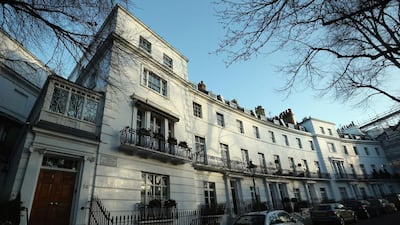Investment flows from the Middle East into global commercial real estate plunged by 50 per cent in the 12 months to June 2017, as investors faced fierce competition from rivals in Asia Pacific (Apac).
Total outward capital investment flows from the Middle East totalled US$10.1 billion between July 2016 and June 2017, a steep decline from $21.2bn the previous year, according to real estate broker CBRE Middle East.
“The total volume was down about 50 per cent, which is significant,” said CBRE Middle East managing director Nicholas Maclean. “But this is not due to a reduction in demand, or the low oil price. It’s that the market is very competitive at the moment and there are monies coming from other parts of the world that are effectively outbidding investors from this region.”
CBRE’s latest annual report on commercial real estate investment flows in and out of the Middle East said the drop to levels recorded in 2013 and 2014 follows a period of “exceptionally strong investment activity”. The region remains a major source of capital globally, representing 8 per cent of total cross-regional investments.
_______
Read more:
Why Hong Kong investors are snapping up London's "trophy" assets
Is now the time for Gulf investors to buy London property?
_______
However, Arabian Gulf investors are facing unprecedented competition from Asia Pacific – in particular, investment capital from Hong Kong that is being pumped into liquid trophy assets in “gateway” global cities, such as London.
From 1990 to approximately 2014, Hong Kong investors allocated a total of $4bn to central London offices, CBRE claims. However, in the first three quarters of 2017 alone, almost $5bn has been allocated already.
This has been driven in part by China’s new capital controls on outbound property investment imposed this summer. Chinese capital is increasingly flowing through Hong Kong entities instead, explained CBRE’s head of research Jos Tromp.
The subdued oil price had some impact on outbound Middle East real estate investment, as it meant lower inflows to regional funds, the report said. However, this has not dampened investor appetite.
Of the total $10.1bn, London was the top destination for Middle Eastern investment over the period, accounting for around $1.7bn. New York came second with $820 million, followed by Washington and Frankfurt, with $469m and $348m respectively.
In line with previous years, sovereign wealth funds remained the main source of capital outflows from the region, acquiring $5.4bn of real estate assets globally. This represented a 17 per cent decline year-on-year, CBRE said.
However, Mr Maclean said the Middle East would “regain its competitiveness” in the months ahead and levels of outbound investment would recover.
“We are still seeing enquiry levels at historically high levels from GCC investors in particular,” MR Maclean said. “If demand is any indicator of the volume of transactions going forward we would expect that to increase significantly and return to previous levels seen in the last two to three years.
“Further, we believe that if Apac buyers were not in the marketplace, then the level of transactions GCC investors were involved in would be similar to last year. We think that competitiveness will be regained.”
Mr Maclean added: “The GCC economy is worth approximately 2 to 2.5 per cent of global GDP but the amount of investment capital has ranged between 8 and 15 per cent of the total investment globally, so that level of disproportionate importance to the real estate market globally is certainly going to be recovered going forward.”
In terms of inward capital flow, investment activity remained strong despite economic headwinds, CBRE’s report said. However, the regional investment market remains characterised by low deal volumes and relative illiquidity driven by lack of available investment products for sale, according to the report.

